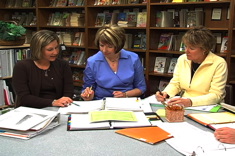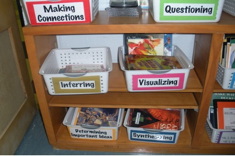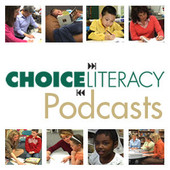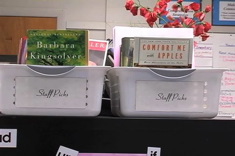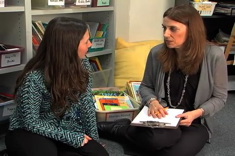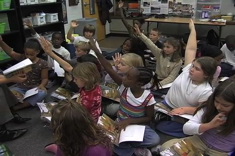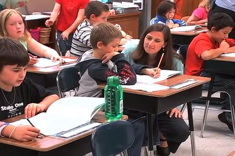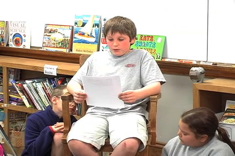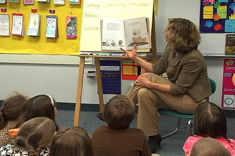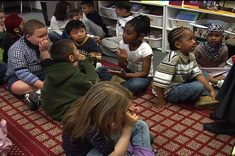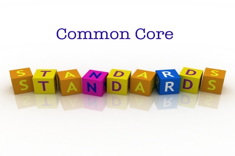Leadership
Do you guide teachers, specialists, and literacy coaches? Here are tools, advice, and strategies school leaders need for their daily work in staff meetings, study groups, and one-on-one discussions with colleagues. If you have a leadership role in coaching teachers and designing professional development, you'll want an upgraded membership with access to our Leaders Lounge.
Latest Content
From Hearing to Listening
Jennifer Jones finds there is a world of difference between hearing and genuinely listening to the teachers who come to her for support. She shares some simple questions she uses at the start of professional conversations to ensure she is providing the right kind of response.
Coaching Monkey
Heather Rader has advice for literacy coaches looking for honest appraisals of their work from colleagues.
Virtually Coaching a Lesson
Coaching cycles look different depending on teachers' needs. Via email and phone, Heather Rader has professional conversations with a teacher as he plans and designs a lesson for observation.
Tips from Literacy Leaders for Closing Out the School Year (ROUND-UP)
Here are some suggestions from Choice Literacy Contributors of the best ways to close out the year, with everything from personal organizing tips to family events.
Not That Into Me
If you're a literacy coach, those teachers who don't want to work with you can make you feel like the wallflower at the prom or the last kid picked for the basketball team. Heather Rader has positive, proactive suggestions for making the best of an awkward situation.
Ubiquitous Venns, Watch Fors, and Leverage Points: Coaching for Depth
Heather Rader examines the use of Venn diagrams as a catalyst for thinking about how to coach for more depth in classrooms.
Rethinking Mentor Texts
Shari Frost writes about the ways our perfectly organized bins may limit the teaching possibilities for many books. She takes readers step by step through her process of determining ways to use a sample mentor text to teach a multitude of lessons and strategies.
What Matters Most: A Conversation with Samantha Bennett (PODCAST)
Samantha Bennett is the author of That Workshop Book: New Systems and Structures for Classrooms That Read, Write, and Think, and works with teachers and literacy leaders across the country to create vibrant school learning communities. In this podcast, she chats with Franki Sibberson about what matters most in schools.
Getting the Most Out of Visiting a Colleague’s Classroom (PODCAST)
Tammy Mulligan and Clare Landrigan talk with Franki Sibberson about strategies for getting the most out of observing in a colleague’s classroom.
Virtual Book Clubs for Teachers
It’s virtually possible to get together around a book without getting together at all. Shari Frost shows us how.
An Attitude of Gratitude
Heather Rader gets three nasty emails, and thinks through how to hold on to an attitude of gratitude when dealing with colleagues who are short-tempered or demanding.
Transitioning to Guide on the Side: Facilitating Collaborative Scoring
Heather Rader wants to transition to more of a guide-on-the-side role as she coaches colleagues. Here are some simple strategies she uses to move offstage during collaborative scoring workshops.
Simplexity: Finding Your Focus
Jennifer Allen visits a thriving cupcake store in Boston that doesn’t sell any cupcakes. It turns out to be the perfect example of “simplexity” – Michael Fullan’s term for maintaining focus on goals and a larger purpose. Jennifer writes about how simplexity applies to professional development planning for literacy leaders.
Putting the “Mini” Back in Minilessons
We know that the shorter our minilesson, the more time students will have to read and write, but it's not easy for many of us. Shari Frost has tips to shape up minilessons that have become maxilessons.
Off the Dance Floor and Onto the Balcony: Getting the Big Picture in Schools
In the day-to-day triage of our schools and the sense of urgency that pushes us to always be accountable for every minute of the day, it is understandable that we tend to forget to pause to think about our larger goals. No one wants to “waste time.” This activity helps everyone keep the big picture in mind.
Keeping Students Front and Center
Jennifer Allen realizes that her biggest fear as a literacy coach is forgetting to keep students at the heart of our coaching conversations. With this in mind, she shares what keeps student learning as her primary focus.
A Bad Case of the Never-Ending Januaries
With a tough winter and tougher budget prospects, many schools will be dealing with the Januaries straight through March. Our contributors have suggestions for dealing with stress, fatigue, and depression to help renew and re-energize your work.
A Class with More Boys Than Girls
Heather Rader coaches a teacher who considers her boy/girl ratio and how it may be affecting students' understanding of directions and time on task.
Poetry Fridays (and So Much More) for Students and Staff
 Mary Lee Hahn finds Poetry Fridays are about so much more than poetry, or even a pleasant end to the week. She shares how this activity is a wonderful way to bring together colleagues and students.
Favorite Short Mentor Texts for Demonstration Lessons
For teacher leaders who are called upon to do demonstration lessons, here is a “must-have” list of short, potent books.
Sense of Little Engines
Heather Rader writes about "agency" – the challenge of letting students and teachers take charge of their learning. In concrete examples from a third-grade classroom and a professional development scoring session with teachers, Heather shares the subtleties of learning to trust, wait, and celebrate when learners of any age are responsible and independent.
Lesson Structure: Building a Strong Foundation
Stepping back to think about the design of quality instruction is essential for any teacher. Heather Rader looks to brain research and tried-and-true practices to lay out lesson components.
Clare Landrigan and Tammy Mulligan on Getting the Most Out of Grade-Level Team Meetings (PODCAST)
In this podcast, Clare Landrigan and Tammy Mulligan, the founders of Teachers for Teachers, talk with Franki Sibberson about how to link grade level team meetings with student achievement, and build stronger teaching communities at the same time.
Whole-Group Share Sessions in Literacy Workshops: Essential Elements
Tammy Mulligan and Clare Landrigan found that even though the group share is the shortest part of the workshop, teachers reported many issues that needed attention. These issues can be resolved with attention to the framework, modeling and more.
What’s Good for the Goslings is Good for the Geese: Parallels Between Scaffolding Student Learning and Scaffolding Staff Development
Terry Thompson considers the concept of “scaffolding” for both student learning and professional development.
Photovoice: Exploring Content Literacy with Images
As Suzy Kaback explores the question “How does your expertise function?” she explains the power of Photovoice and details its use in K-12 classrooms.
Walk Arounds: Gathering Data to Test Assumptions
Do you have a tattler in your midst? Not a child, but a teacher complaining about the work habits of a colleague? Jennifer Jones explains her proactive use of walk-arounds to gather data and confront misconceptions.
Common Core Conversations: The Half ‘n’ Half Shift for Nonfiction Reading and Writing
Colleagues and coaches, Amanda Adrian and Heather Rader, explore the upcoming shifts in English Language Arts and anticipate what it will mean for leaders, teachers and most importantly, students.
Quick and Thorough: Literacy Coach Conferring Notes
Jennifer Jones finds in a time of budget cuts it is more important than ever for literacy coaches to keep good records of how they spend their time with teachers. She shares a very simple spreadsheet system which includes content codes and brief notes.
Digital Handouts: An Alternative to More Paper and Meetings
Jill Ostrow creates a flexible and practical online tool to support teachers of English language learners.
Browse Content By
Type
Category
- Assessment Tools
- Big Fresh Archives
- Booklists
- Choice Numeracy
- Classroom Design
- Common Core
- Community Building
- Conferring
- Content Literacy
- Digital Literacy
- English Language Learners
- Equity
- Family Relations
- Free Samples
- Guiding Groups
- Leadership
- Literacy Coaches
- Mentor Texts
- Minilessons
- New Teacher Mentors
- Podcasts
- Poetry
- Quote Collections
- Reading Strategies
- Self Care
- Struggling and Striving Learners
- Talking and Listening
- Teacher Study Groups
- Teaching Reading
- Teaching Writing
- Word Study and Vocabulary
Author
- Melissa Quimby
- Nawal Qarooni
- Gwen Blumberg
- Julie Cox
- The Lead Learners
- Hannah Tills
- Josie Stewart
- Ruth Metcalfe
- Mallory Messenger
- Becca Burk
- Jodie Bailey
- Vivian Chen
- Mary Brower
- Tiffany Abbott Fuller
- Stephanie Affinito
- Ruth Ayres
- Leigh Anne Eck
- Heather Fisher
- Shari Frost
- Julie Johnson
- Suzy Kaback
- Gigi McAllister
- Shirl McPhillips
- Melanie Meehan
- Cathy Mere
- Debbie Miller
- Tara Barnett and Kate Mills
- Tammy Mulligan
- Dana Murphy
- Bitsy Parks
- David Pittman
- Brenda Power
- Heather Rader
- Matt Renwick
- Mandy Robek
- Christy Rush-Levine
- Gretchen Schroeder
- Jen Schwanke
- Brian Sepe
- Katherine Sokolowski
- Stella Villalba
- Jennifer Vincent
Grade Level
Choice Literacy Membership
Articles
Get full access to all Choice Literacy article content
Videos
Get full access to all Choice Literacy video content
Courses
Access Choice Literacy course curriculum and training




